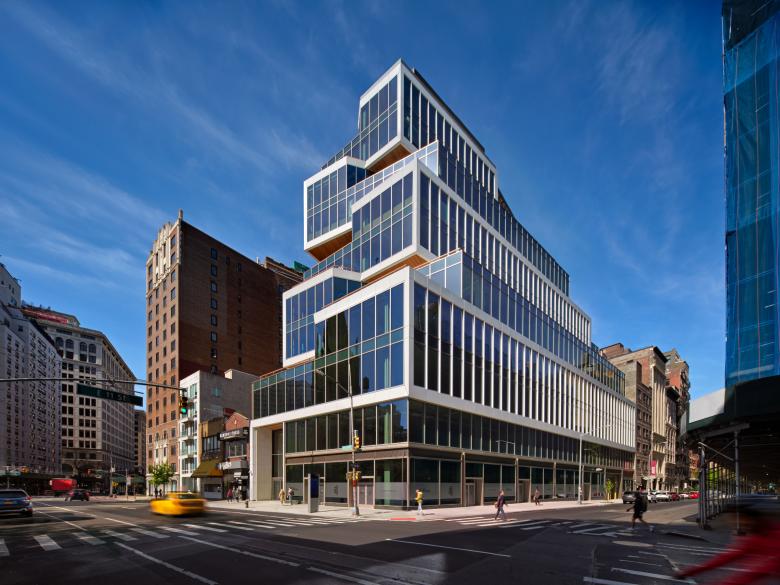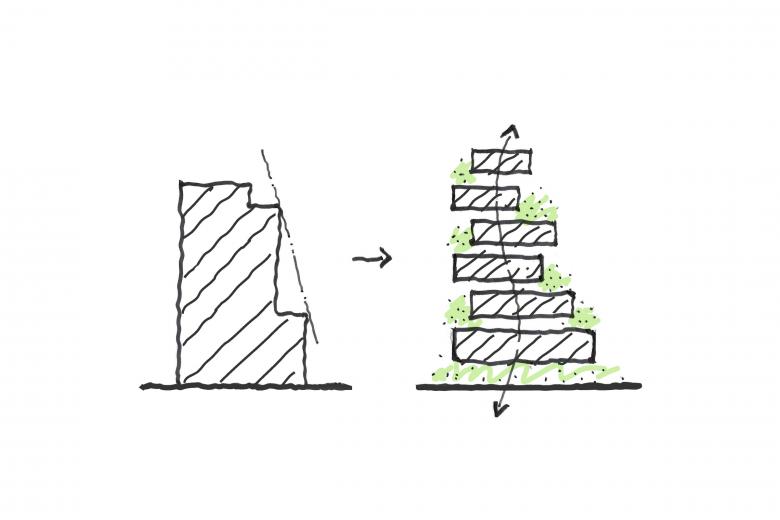US Building of the Week
799 Broadway
Vistas looking north up Broadway in Lower Manhattan are dominated by the tower of Grace Church, positioned where the famous thoroughfare bends. Directly across the street from the landmark church is 799 Broadway, a new office building designed by the New York studio of Perkins&Will. As explained by design principal Robert Goodwin, the design of 799 Broadway took inspiration from Broadway, its landmark neighbor, and other aspects of the urban context.
Location: New York, NY, USA
Client: Columbia Property Trust
Architect: Perkins&Will
- Design Principal: Robert Goodwin, FAIA
- Project Architect: Pablo Sepulveda
- Project Manager: Michael Woods
- Interior Designer: Jeanette Kim
MEP/FP Engineer: Cosentini
Landscape Architect: Weintraub Diaz
Lighting Designer: Kugler Ning Lighting Design
Contractor: Consigli Construction
Acoustics: Longman Lindsey
Building Enclosure: Vidaris
Civil Engineer: Bohler Engineering
Vertical Transportation: Buckley Belcher
Code/Zoning: Rizzo Group
Facade Maintenance: Lerch-Bates
Site Area: 19,575 sf
Building Area: 182,000 sf
See bottom for list of Important Manufacturers / Products.
Perkins&Will was selected as the architect for 799 Broadway through a competitive two-stage RFP (Request for Proposals) process beginning with a proposal that included a conceptual design and followed by an in-person interview. Our innovative response conceived of the proposal in the format of a tenants “lifestyle magazine” that featured “articles” describing our qualifications, project team, design approach, schedule and fee. The interview was staged as a “panel discussion” led by a moderator and featured a large study model of the proposed design. We were told that we prevailed over our competitors by focusing as much on tenant experience as on building design.
799 Broadway is a 12-story, 182,000-square-foot office building located at the intersection of Broadway and 11th Street, just south of Union Square in Greenwich Village, Manhattan. The client brief was to analyze the development potential of the site and create a new building intended to attract tech/advertising/media/information (TAMI) tenants. The site’s adjacency to New York University and Union Square as well as major technology and media corporations in the area suggested the development be positioned as a new type of office building with curated amenities and outdoor workspace not offered in recent NYC commercial developments.
The design of 799 Broadway was influenced equally by response to urban context and focus on human experience.The building creates a new paradigm for workplace environments with a light-filled, humanly scaled and technology-enhanced design that celebrates the unique moment where Broadway first bends away from the north-south axis. Sensitive to the transitional scale of the neighborhood, the design works within zoning parameters to create a rhythmic cascade of interlocking forms that limit continuous vertical walls to no more than two stories. The alignment of these forms alternates between the angle of Broadway and the dominant Manhattan grid, creating a dynamic expression of the urban dialogue inherent in the site. The result is a series of open, flexible interior spaces that connect on almost every level with generous, functional landscaped terraces, bringing nature inside and extending the workplace outdoors. Interior space feature exposed cast-in-place concrete structure and ceilings, reinventing and modernizing the traditional New York City loft with efficient mechanical systems and column-free spaces.
The design directly links to the church courtyard across Broadway to empahazize this connection with nature. The double-height lobby, clad in faceted wood panels, angles upwards to capture the scale of the church tower, and leads to a shared amenity courtyard that serves as a unique focus for social and business activities. This space doubles as the outdoor component of a tenant lounge on the lower level, where many of the building’s amenities are housed, including a gym with a locker room, showers, and ample bike storage. Retail frontage along Broadway further integrates the building into its vibrant surroundings, while on the rooftop, a terrace boasts views of the East River, Tribeca, One World Trade, and the Hudson River. The building’s materials also respond to the unique qualities of the site. 799 Broadway’s simple palette of white metal panels and vertical fins evokes the classic cast-iron facade of a neighboring building found across 11th Street, while also referencing the original “sugar cube” limestone of Grace Church.
With a focus on offering tenants increased access to outdoor space even prior to the COVID-19 pandemic, 799 Broadway was ahead of its time in many ways. The building was designed to meet the standards of the WELL Building certification program, and the building was comprehensively adapted during construction to lead a new generation of New York office buildings focused on health, safety, and wellness. It is designed to reduce the risk of contracting COVID-19 and other viruses. In addition to high-performance base-building HVAC systems, UV light sanitation and bipolar ionization enable the building to exceed the highest standards of indoor air quality and air purification. 799 Broadway has already been awarded a Fitwel® 2-Star Rating for its incorporation of evidence-based design and operations strategies to support the physical, mental, and social health of its occupants.
799 Broadway is LEED V.4 Gold-certified, employing a comprehensive approach to sustainability and incorporating aspects of passive design to create a building that is energy efficient, resilient, and wellness-focused. Recognizing that energy use would be driven by the need for cooling, heat gain is controlled by locating the core on the south wall. The relatively narrow floorplate means that workspaces are rarely located more than 60 feet from a window, limiting the need for artificial light, and the facade design takes advantage of “Zone Green NYC” which rewards building designs that exceed NYC Energy Code by 80%. The abundant functional terraces provide tenants with easy access to the outdoors on almost every floor of the building, which also facilitates both transit and bicycle access.
While the exterior employs a relatively neutral glass and metal system to create a high-performance envelope, the palette of the building also features natural wood, which unusual in NYC office buildings. At the soffits defined by the terracing forms along Broadway, at the roof terrace, and in the building lobby, slatted wood panels highlight special places and emphasize the integration of nature into the tenant experience.
Email interview conducted by John Hill.
- Exterior wood ceiling panels: 9wood
- Exterior stone panels: Marmi Faredo
- Lobby wood slat ceiling: Platinum Millworks
- Lobby stone panels: Stone Source
- Wood flooring: Carlisle








